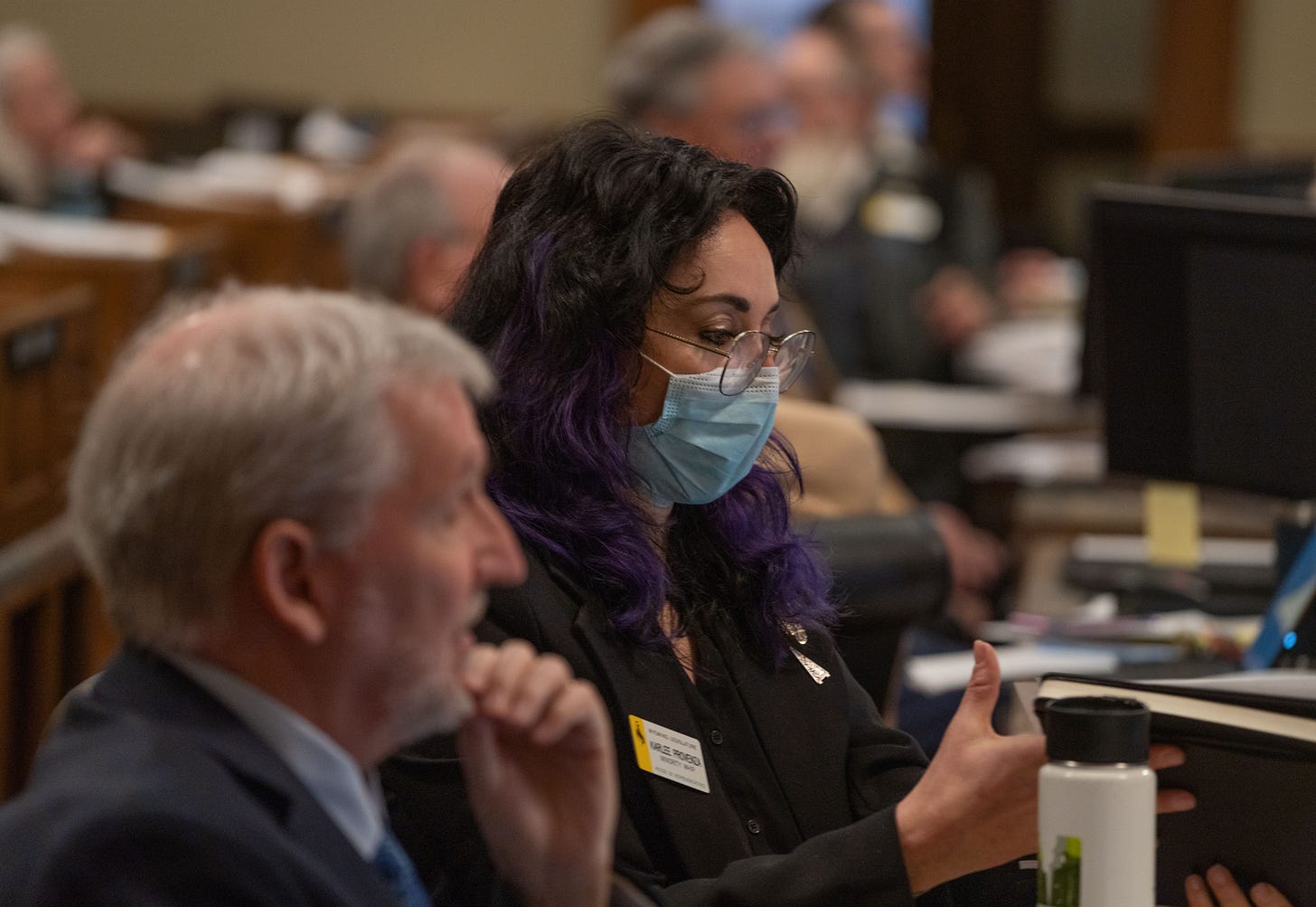Governor signs police oversight bill into law
The Peace Officer Standards and Training Commission will now be able to view personnel records relevant to decertification investigations. POST is currently investigating Derek Colling.
The state’s main police oversight agency now has explicit permission to view the personnel records of officers it’s investigating.
Gov. Mark Gordon signed House Enrolled Act 31 into law last week, altering the Wyoming Public Records Act to grant this permission. The new legislation specifies that the agency can access the “portion of a personnel file that is specifically related to a complaint” and relevant to the qualifications Wyoming legally requires of its officers — including “good moral character” and physical, emotional and mental fitness.
Previously, a legal loophole allowed officers under review to halt the release of these records to the oversight agency.
The passage of this new law comes as a “massive relief” to Albany County’s Debbie Hinkel, for whom the issue of police accountability is intensely personal.
“I’m just so relieved,” Hinkel said. “I feel like this is kind of putting a closure on what I felt like I had to do to make a change that needed to be made.”
In 2018, former Albany County Sheriff’s Deputy Derek Colling shot and killed Hinkel’s son, Robbie Ramirez, who was unarmed. Colling was known to have a violent past when he was hired by the Albany County Sheriff’s Office, having previously beaten a videographer filming him in Las Vegas. Ramirez was the third person Colling killed or had a hand in killing.
The 2018 incident ignited local calls for greater police accountability and, when Colling was neither fired nor charged, eventually led to changes in county leadership. Colling was eventually forced out by the new sheriff, but he was able to keep his certification. That means he could still work at another law enforcement agency, assuming another agency was willing to have him. He is not currently working in law enforcement.
So far, attempts to investigate the man for possible decertification have been halted by the legal loophole HEA31 has now closed.
In the meantime, Hinkel has sought justice in other ways. She has poured her energy into Robbie’s House — a community and resource center for those living with mental illness, as her son had. She also launched a wrongful death lawsuit against the county, which settled last year for $1.2 million.
Hinkel was at a pitstop, traveling to a track meet with her daughter and granddaughter, when she heard HEA31 had advanced out of the legislature. She started sobbing.
“They both look at me like, ‘Oh my god, who died?’” Hinkel said. “It was because [Rep.] Karlee [Provenza] had just called me and told me that it had passed unanimously. I said, ‘No, no, it’s happy tears.’ But I was just sobbing with relief.”
Hinkel had testified in favor of the bill back during the interim, before the session, as the legislation was being drafted. She told lawmakers she had spent the last four and a half years waking up in the middle of the night — not because she had lost her son, but because she felt justice had never been served.
With the passage of this new law and the possibility of Colling’s decertification on the horizon, Hinkel said she’s finally able to sleep through the night.
“That injustice ate on me so badly,” she said. “Now I can move forward and just focus on Robbie’s House and helping people with mental illness. This can be behind me.”

Closing a loophole
The Peace Officer Standards and Training (POST) Commission is tasked with certifying and decertifying police officers, sheriff’s deputies and correctional officers with the goal of ensuring that only those worthy of a badge are wearing one.
POST decertified a former Albany County Sheriff’s Corporal in 2021 who had been fired and accused of racist abuse; it also decertified a former Laramie Police Officer in 2022 following his conviction for domestic violence.
But POST so far has been unable to conclude its investigation into the man who killed Hinkel’s son.
POST has been thwarted by Colling’s own refusal to grant access to his personnel records. The sheriff’s office, fearing litigation, went to court to shield Colling’s records from POST.
“I just was blown away that [POST] was unable to get it and had to subpoena for it several times — and it was still refused, over and over again,” Hinkel said. “But if you have an officer threatening a lawsuit against their hiring agency, that puts them in a bad position too.”
Albany County District Court Judge Misha Westby ruled in the sheriff’s favor, saying she felt like POST should have access to the personnel records in theory — but couldn’t read the current law that way.
It all came down to the specific language of the Wyoming Public Records Act. The act enshrines the right of public access to many of the documents generated by government. But it specifies that some documents should be shielded from outside eyes — either for reasons of public safety or for reasons of employee privacy.
The Public Records Act forbids disclosure of employee personnel records in most circumstances and clarifies that such records should only be viewable by an employee’s “supervisor.”
The act made no exception for state agencies like POST, which is not a supervisor but nonetheless is tasked with reviewing government employees’ fitness for duty.
House Enrolled Act 31 fixes that, updating the act to give POST access in addition to the supervisors.
Albany County Rep. Karlee Provenza (HD-45) shepherded the bill through the interim and throughout the 2024 Budget Session.
“If we want to protect the sanctity of — the legitimacy of — law enforcement, we have to allow for an accountability mechanism,” she told the Senate Judiciary Committee as it considered the bill. “If you’re an attorney, you have to answer to the Wyoming State Bar if you engage in some sort of misconduct. They can pull your text messages, your bank records, anything that they need. And I would submit to you, committee, [lawyers] don’t have the legal right to kill you. So I don’t think that we’re asking too much to allow the certifying agency to ask for these records.”

‘Truly representing us’
Hinkel had nothing but praise for her representative.
She said Provenza, one of the legislature’s most progressive members, often faces pushback from her colleagues and members of the public — the representative told WyoFile she regularly receives death threats — but with her background as a community organizer, Hinkel said she excels at building coalitions and talking across the aisle.
“Some of [her colleagues] have come around to realize that she’s thoughtful and she’s trying to make intelligent laws that are meaningful and that help protect the public,” Hinkel said. “I mean, she’s truly representing us.”
The Wyoming Highway Patrol and the Wyoming Association of Sheriffs and Chiefs of Police pushed back on some of the language in the bill, seeking to scale back its reach and limit what POST would be able to access. These comments precipitated an amendment that did just that, clarifying that the only records viewable by POST are those “specifically related to a complaint.”
WHP and WASCOP then pushed to limit the scope of the bill even further, but were unsuccessful.
Otherwise, HEA31 soared through the legislature. Each time it came up for a vote, lawmakers voted unanimously to advance the bill — 9-0 in the House Judiciary, 62-0 on the House floor, 5-0 in the Senate Judiciary, 30-0 on the Senate floor (with one excused). In a year where so many bills and even simple amendments pitted warring factions against each other, HEA31 enjoyed overwhelming bipartisan support.
Gov. Gordon signed the bill into law March 7, alongside 21 other bills passed by the legislature. HEA31 goes into effect July 1.
POST Director Chris Walsh would not comment about an ongoing investigation, but confirmed the Colling investigation is still active. The former deputy’s certification expired last fall, but POST still has the power to issue a decertification. If it does decertify Colling, that action will effectively prohibit him from working in law enforcement ever again.
Hinkel is longing for that day. Until then, she has work to do.
“Is this justice for Robbie?” Hinkel said. “Only partially. But still it’s at least a step in the right direction.”





Who are the people that make up POST?
My thoughts, as I wasn't here when this case happened, is that a lot of files that POST decides to open from past cases that were paid out money or NDA's were signed will end up in litigations for awhile as well.
* I also don't oppose this new law that removes a loop-hole. I think everyone should be transparent as possible within the law.